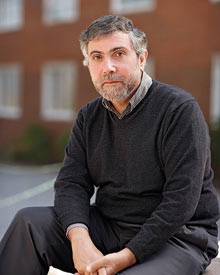Economic theory once held that countries export what they are naturally suited to produce: one is good at making cars, another at making wine, so they exchange their products. But after World War II, it became clear that trade is in fact dominated by countries that import and export the same types of goods. In 1979, economist Paul Krugman, PhD ‘77, explained why.

Krugman contended that economies of scale encourage global trade, and that consumer demand for variety fosters trade in competing versions of similar goods. He integrated this work on trade with work in economic geography, where he explored the worldwide flight of people to cities in search of higher wages, lower prices, and greater selection of goods. For this combined approach, the Princeton economist and New York Times columnist was awarded the 2008 Nobel Prize in economics on October 13.
“My reaction to the award is the Sally Field line: ‘They like me, they really like me!’” says Krugman, who served on MIT’s faculty for 17 years between 1980 and 2000. “Professionally, I don’t think [the Nobel] matters among economists–they can judge my work on its own merits or lack thereof. In my journalistic job, I guess it’s a nice way to let readers know that I have a bit of background in the field.”
Keep Reading
Most Popular
Large language models can do jaw-dropping things. But nobody knows exactly why.
And that's a problem. Figuring it out is one of the biggest scientific puzzles of our time and a crucial step towards controlling more powerful future models.
How scientists traced a mysterious covid case back to six toilets
When wastewater surveillance turns into a hunt for a single infected individual, the ethics get tricky.
The problem with plug-in hybrids? Their drivers.
Plug-in hybrids are often sold as a transition to EVs, but new data from Europe shows we’re still underestimating the emissions they produce.
Stay connected
Get the latest updates from
MIT Technology Review
Discover special offers, top stories, upcoming events, and more.